Search Results
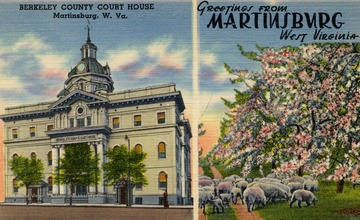
- IDNO:
- 041798
- Title:
- Berkeley Court House; Martinsburg, W. Va.
- Description:
- Caption on postcard reads: "Martinsburg is in the center of the Maryland-West Virginia-Virginia apple belt, and is the northernmost city in the famed Shenandoah Valley. It is the county seat of Berkeley County, which was named for Norbonne Berkeley, Baron de Botetourt, Virginia's most popular colonial governor. In 1801 Berkeley, which extended from the Blue Ridge to the Alleghanies, was divided and the eastern half organized as Jefferson County. In 1863 Berkeley and Jefferson were placed in West Virginia due to the influence of the B. & O. Railroad. The present Court House was built in 1809." Published by John Myerly Company. (From postcard collection legacy system.)

- IDNO:
- 041799
- Title:
- Berkeley Co. Court House; Martinsburg, W. Va.
- Date:
- ca. 1916
- Description:
- See original for correspondence. Published by Fred H. Baker. (From postcard collection legacy system.)
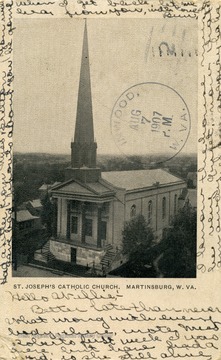
- IDNO:
- 041800
- Title:
- St. Joseph's Catholic Church; Martinsburg, W. Va.
- Date:
- ca. 1907
- Description:
- See original for correspondence. (From postcard collection legacy system.)
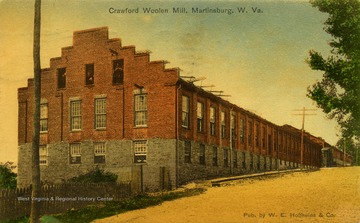
- IDNO:
- 041801
- Title:
- Crawford Woolen Mill; Martinsburg, W. Va.
- Date:
- ca. 1909
- Description:
- In 1891 W.H. Crawford established the Crawford Woolen Company which employed fifteen workers and produced around seven hundred yards of cloth a week. In less than fifteen years Crawford's textile plant failed due to the old age of the operating machines and low capital. During the same time a number of modern electric powered mills moved to Martinsburg, turning it into an important textile center. Published by W.E. Holfheins & Company. (From postcard collection legacy system.)
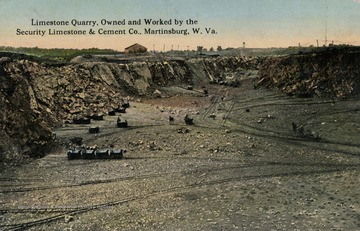
- IDNO:
- 041802
- Title:
- Limestone Quarry, Owned and Worked by the Security Limestone and Cement Co.; Martinsburg, W. Va.
- Date:
- ca. 1918
- Description:
- See original for correspondence. Published by Louis Kaufmann & Sons. (From postcard collection legacy system.)
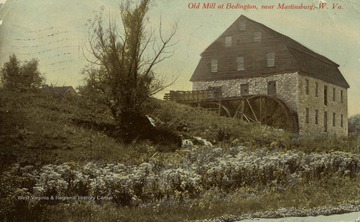
- IDNO:
- 041803
- Title:
- Old Mill at Bedington, Martinsburg, W. Va.
- Date:
- ca. 1911
- Description:
- See original for correspondence. Published by Fred H. Baker. (From postcard collection legacy system.)

- IDNO:
- 041804
- Title:
- One Million Bushels of Apples; Martinsburg, W. Va.
- Description:
- Caption on postcard reads: "A million bushels of apples at Martinsburg, West Virginia, the apple center of the Eastern panhandle of West Virginia. This area is the apple basket of the world with large canning and vinegar plants processing the fruit, even utilizing the core and the seeds for stock feed." Published by Naturecraft. (From postcard collection legacy system.)
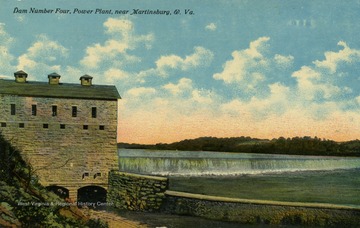
- IDNO:
- 041805
- Title:
- Dam Number Four, Power Plant; Martinsburg, W. Va.
- Description:
- Published by Louis Kaufmann & Sons. (From postcard collection legacy system.)
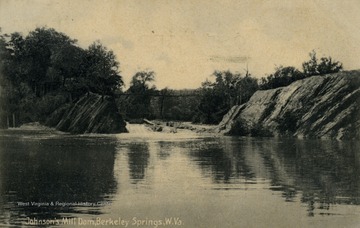
- IDNO:
- 041806
- Title:
- Johnson's Mill Dam; Berkeley Springs, W. Va.
- Date:
- ca. 1910
- Description:
- See original for correspondence. (From postcard collection legacy system.)
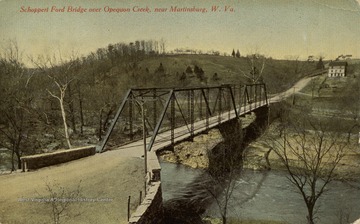
- IDNO:
- 041807
- Title:
- Schoppert Ford Bridge Over Opequon Creek; Martinsburg, W. Va
- Description:
- Bridge washed away in 1936 flood. Published by Fred H. Baker. (From postcard collection legacy system.)

- IDNO:
- 041809
- Title:
- Newton D. Baker Veterans Administration Hospital; Martinsburg, W. Va.
- Description:
- Caption on postcard reads: "This Veterans Hospital, which is located about five miles from Martinsburg, West Virginia is one of the many hospitals operated by the Veterans Administration in the United States. Approximately 1,400 beds are available for veterans' use. Published by Marken & Bielfield Incorporated. (From postcard collection legacy system.)
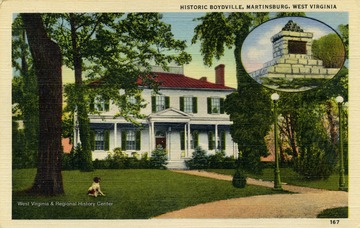
- IDNO:
- 041810
- Title:
- Historic Boydville; Martinsburg, W. Va.
- Description:
- Caption on postcard reads: "This beautiful home was built in 1812 by Elisha Boyd. It still remains in the family and is owned by Charles J. Faulkner, Jr., grandson of the builder. It is noted for its gorgeous interior workmanship. Inset is the marker on the Boydville Estate erected to General Adam Stephen, Revolutionary War commander, legislator and founder of the city. The monument was erected by The Daughters of the American Revolution." Published by Marken & Bielfeld Inc. (From postcard collection legacy system.)